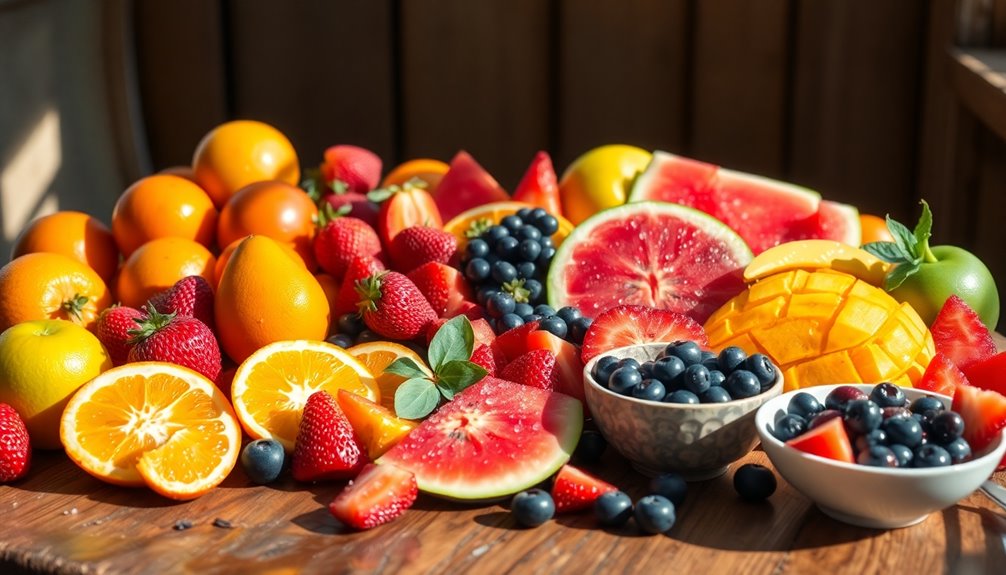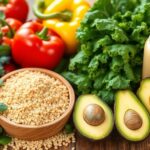The fruitarian diet consists mainly of raw fruits, emphasizing health, sustainability, and ethical living. It can improve your energy levels, enhance digestion, and support weight management while reducing the risk of chronic illnesses. However, you may face challenges with nutrient deficiencies, particularly in protein, vitamin B12, and omega-3 fatty acids. To overcome this, it's vital to diversify your fruit choices and consider adding nuts or seeds. Proper planning and community support can help you shift successfully. If you're curious about how to navigate these obstacles, explore more insights into this unique lifestyle.
Key Takeaways
- The fruitarian diet consists primarily of fruits, promoting health benefits like weight management and enhanced digestion.
- It emphasizes ethical living and environmental sustainability by reducing carbon footprints and supporting local farming practices.
- Key nutritional challenges include potential deficiencies in protein, vitamin B12, iron, and omega-3 fatty acids, requiring careful planning.
- Fruits are rich in fiber and antioxidants, which aid digestion, hydration, and skin health, while also reducing chronic illness risks.
- Community support and gradual transition strategies help individuals adapt to a fruitarian lifestyle while listening to their body's nutritional needs.
Overview of the Fruitarian Diet

The fruitarian diet, gaining popularity in recent years, consists primarily of fruits, often comprising 70% to 100% of an individual's total food intake. This approach to eating appeals to many for its simplicity and perceived health benefits. You'll find that the diet not only emphasizes fruits but also encourages a strong ethical framework, aligning with compassionate living and environmental sustainability. Many fruitarians believe that consuming fruits supports ethical considerations by minimizing harm to animals and promoting plant-based lifestyles.
As you explore the fruitarian diet further, you may also uncover a profound spiritual connection to nature. Many followers feel that eating fruits, which are often viewed as gifts from the earth, fosters a greater appreciation for the environment and a sense of unity with the natural world. This connection can enhance your spiritual well-being and encourage mindfulness in daily eating habits. Additionally, understanding the potential nutritional challenges of such a restrictive diet is essential for maintaining overall health.
However, it's crucial to recognize that while the fruitarian diet can offer benefits, it may also pose nutritional challenges. Relying heavily on fruits may lead to deficiencies in essential nutrients like protein, vitamins, and minerals. Balancing your diet with other food groups might be necessary to maintain optimal health.
Types of Fruits to Include

Including a variety of fruits in your diet is necessary for maximizing the health benefits of a fruitarian lifestyle. You'll want to focus on incorporating seasonal variety, which means choosing fruits that are in season in your region. This not only enhances the flavor of your meals but also guarantees you're getting fruits at their peak nutritional value. For instance, summer brings berries and stone fruits, while winter offers citrus fruits and apples. Each season presents a unique selection that can keep your meals exciting and nutritionally diverse.
Furthermore, organic sourcing plays a vital role in maintaining the integrity of your fruitarian diet. Organic fruits are grown without synthetic pesticides or fertilizers, which means they're often fresher and packed with nutrients. When you choose organic, you're not just supporting your health; you're also contributing to sustainable farming practices that benefit the environment and local communities.
In your fruitarian journey, consider including a mix of sweet fruits like bananas and mangoes, as well as tangy options like kiwi and pomegranate. Incorporating a range of textures and flavors will keep your meals interesting. Don't forget to experiment with dried fruits, too, as they can be a convenient snack option. Additionally, focusing on plant-based ingredients can enhance the overall nutritional quality of your meals.
Potential Health Benefits
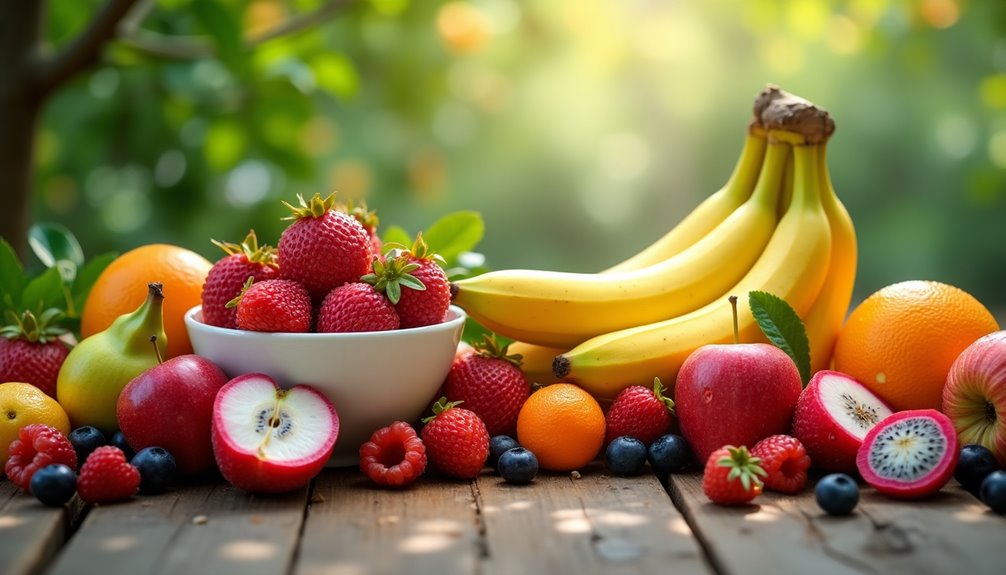
Regularly following a fruitarian diet can offer numerous health benefits that support overall well-being. One of the most significant advantages is disease prevention. Fruits are rich in vitamins, minerals, and antioxidants, which can help lower the risk of chronic illnesses such as heart disease, diabetes, and certain cancers. Consuming a variety of fruits can boost your immune system and promote a healthier lifestyle.
Another key benefit is improved gut health. A fruitarian diet is high in dietary fiber, which promotes regular bowel movements and aids digestion. This fiber helps maintain a balanced gut microbiome, essential for nutrient absorption and overall digestive health. Additionally, embracing a fruitarian diet can lead to increased energy and vitality, enhancing your overall quality of life.
Here's a table summarizing the potential health benefits of a fruitarian diet:
| Health Benefit | Description | Examples of Fruits |
|---|---|---|
| Disease Prevention | Reduces risk of chronic illnesses | Berries, citrus fruits |
| Gut Health | Aids digestion and promotes gut microbiome balance | Apples, bananas |
| Hydration | High water content helps keep you hydrated | Watermelon, cucumbers |
| Weight Management | Low-calorie, nutrient-dense foods | Grapes, peaches |
| Skin Health | Antioxidants promote glowing skin | Avocados, kiwi |
Embracing a fruitarian diet can not only enhance your physical health but also foster a sense of community with others who share your lifestyle choices. By prioritizing fruits, you're nurturing your body while connecting with the vibrant world of plant-based nutrition.
Nutritional Challenges and Deficiencies

Nutritional challenges and deficiencies can arise when committing to a fruitarian diet, primarily due to its restrictive nature. While fruits are packed with vitamins and antioxidants, they often lack essential nutrients like protein, healthy fats, and certain minerals. This can lead to issues such as inadequate nutrient absorption, making it hard for your body to get everything it needs to function optimally.
When you embrace a fruitarian diet, you might find it challenging to meet your protein requirements, which are pivotal for muscle maintenance and overall health. Additionally, crucial nutrients like vitamin B12, iron, and omega-3 fatty acids are typically absent from fruits. Without careful meal planning, you risk developing deficiencies that can affect your energy levels and overall well-being.
To mitigate these challenges, consider diversifying your fruit choices and incorporating dried fruits, seeds, or nuts to boost your nutrient intake. Research shows that combining fruits with other food groups can improve nutrient absorption—so think about how you can creatively include other plant-based options. Incorporating lightweight equipment like mini bands can also enhance your overall fitness routine and support muscle maintenance while on a restrictive diet.
Being part of a community that shares your dietary interests can also help. Engaging with others who follow similar eating patterns can give you valuable insights and support for effective meal planning. By staying informed and proactive, you can navigate the nutritional challenges of a fruitarian diet and create a balanced approach that promotes your health and well-being.
Weight Loss and Energy Levels

Adopting a fruitarian diet can lead to weight loss for many, primarily due to the low-calorie nature of most fruits and their high water content. When you make the switch to this diet, you might notice a decrease in overall calorie intake, which can contribute to shedding those extra pounds. However, it's vital to approach this lifestyle thoughtfully to maintain energy levels while losing weight.
To maximize your success, consider the following tips:
- Meal Planning: Planning your meals helps make sure you consume a variety of fruits, which can aid in meeting your nutritional needs. Create a weekly menu to keep your fruit intake diverse and exciting.
- Exercise Routine: Pairing your diet with a consistent exercise routine can boost your weight loss efforts. Engaging in regular physical activity not only helps you burn calories but also supports your overall energy levels, making you feel more vibrant.
- Stay Hydrated: While fruits have high water content, it's important to drink enough water throughout the day. Staying hydrated improves digestion and boosts energy, keeping you active and focused. Additionally, incorporating fat-melting smoothie recipes from programs like The Smoothie Diet can provide essential nutrients while supporting your weight loss journey.
Environmental Impact
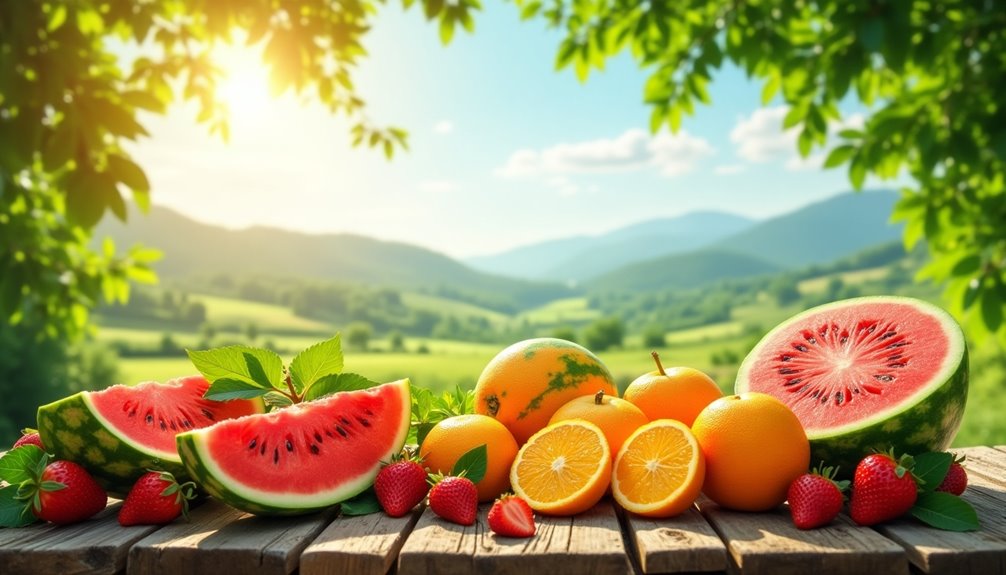
The fruitarian diet not solely influences personal health but also has significant implications for the environment. By choosing to consume mainly fruits, you may actively reduce your carbon footprint compared to traditional diets that heavily depend on animal products. Studies indicate that plant-based diets generally result in lower greenhouse gas emissions, making the fruitarian lifestyle a more eco-friendly option.
However, it's crucial to take into account the farming practices involved in fruit production. Some methods can lead to deforestation, especially in regions where tropical fruits are cultivated. As forests are cleared for plantations, biodiversity suffers, and the carbon sequestration capacity of these ecosystems decreases. Therefore, opting for locally sourced and sustainably farmed fruits can help mitigate these negative environmental impacts.
Water usage is another crucial factor. While fruits often require less water than animal agriculture, certain types of fruit farming can still contribute to water scarcity in some regions. It's important to be aware of the origins of your fruits, as unsustainable farming practices can strain local water supplies and disrupt ecosystems. Additionally, adopting a low-carb diet can further enhance the environmental benefits of your eating habits.
Long-Term Sustainability

Maintaining a fruitarian diet over the long term can pose unique challenges and factors for sustainability. While the diet can be abundant in vitamins and antioxidants, you might face difficulties in nutrient absorption, especially concerning protein, calcium, and essential fatty acids. It's vital to assess how your body reacts to this restrictive diet and take into account supplementation if necessary.
Here are three key elements to bear in mind for long-term sustainability:
- Nutrient Balance: You need to make sure you're receiving adequate essential nutrients. A fruitarian diet can lack certain vitamins and minerals, which could result in deficiencies over time. Regular blood tests can help you track your nutrient levels.
- Ethical Reflections: While many opt for fruitarianism for ethical reasons, it's crucial to contemplate the broader impacts of your dietary choices. Sourcing your fruits sustainably and backing local agriculture can align your diet with your ethical values.
- Social and Lifestyle Compatibility: A fruitarian diet can be socially isolating, especially in social settings focused on food. You'll need to consider how this diet integrates into your life and relationships, as it may necessitate adjustments in social gatherings or meal planning. Additionally, exploring whole food sources of protein may help mitigate some of the dietary restrictions you encounter on a fruitarian diet.
Tips for Starting the Diet

If you're considering a fruitarian diet, it's important to approach the change thoughtfully to guarantee your body adjusts well. Shifting to this diet can be a significant change, so take it one step at a time. Start by gradually increasing your fruit intake while reducing other foods. This way, you can give your body a chance to adapt without overwhelming it.
Meal prep is necessary for success on a fruitarian diet. Plan your meals around seasonal fruits to ensure freshness and variety. Make a list of your favorite fruits and experiment with different combinations. Consider preparing smoothies, fruit salads, or snacks like fruit bars. Having ready-to-eat options will help you avoid cravings for non-fruit items.
Grocery shopping can make or break your fruitarian experience. Seek out local farmers' markets or organic stores to find high-quality, ripe fruits. Buying in bulk can save money and encourage you to try new fruits while ensuring you have enough on hand. Don't hesitate to ask for recommendations from store staff or fellow shoppers—building a community around this lifestyle can enrich your experience.
Lastly, listen to your body. Monitor how you feel as you make changes and adjust your fruit choices accordingly. It's essential to maintain balance and make sure you're meeting your nutritional needs. Additionally, staying hydrated with slimming water(https://example.com) can help boost energy levels and support your overall health during this transition. Remember, you're not alone in this journey, and connecting with others who share similar goals can provide support and motivation.
Common Misconceptions
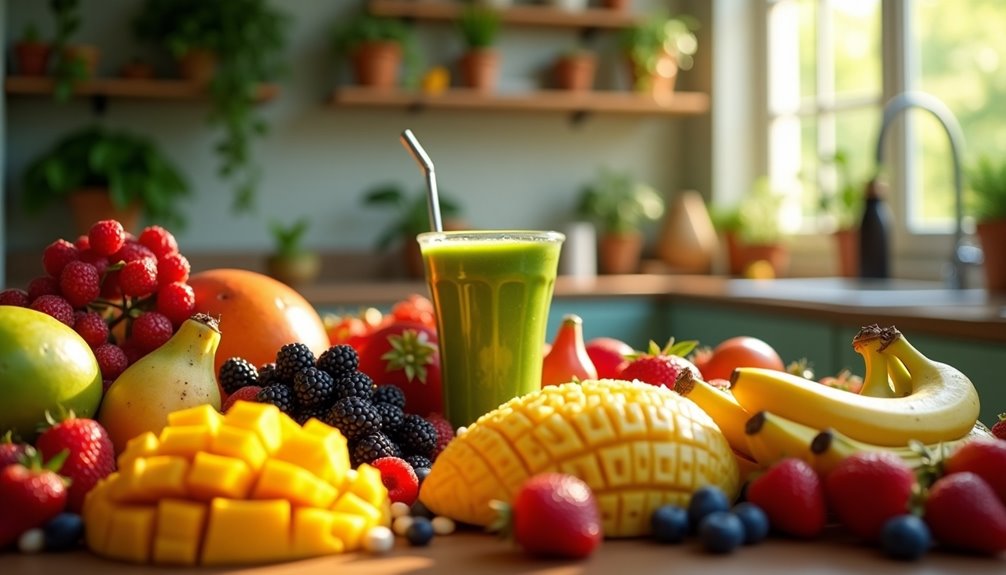
Many people harbor misconceptions about the fruitarian diet that can deter them from trying it or cause unnecessary worry. Understanding these misconceptions can help you feel more confident in your choices and clarify the ethical considerations often associated with this unique diet.
- Nutritional Balance: A common belief is that the fruitarian diet lacks essential nutrients. While it's true that relying solely on fruit can lead to deficiencies, many fruitarians successfully incorporate a variety of fruits to guarantee a more balanced intake. Pairing fruits with nuts or seeds can also help achieve a better nutritional profile.
- Weight Loss vs. Health: Some think the fruitarian diet is purely a weight-loss plan. While many experience weight loss, the diet's focus is on the consumption of whole, natural foods. This approach can foster better overall health when done mindfully, rather than just chasing numbers on a scale.
- Sustainability Issues: There's a notion that being a fruitarian is inherently unsustainable. However, many fruitarians choose locally-sourced, seasonal fruits, which can lessen the environmental impact. Ethical considerations in food choices play a significant role in how you approach the diet, allowing for personal alignment with your values. Additionally, incorporating plant-based diets into your lifestyle can further support sustainability efforts.
Personal Experiences and Testimonials
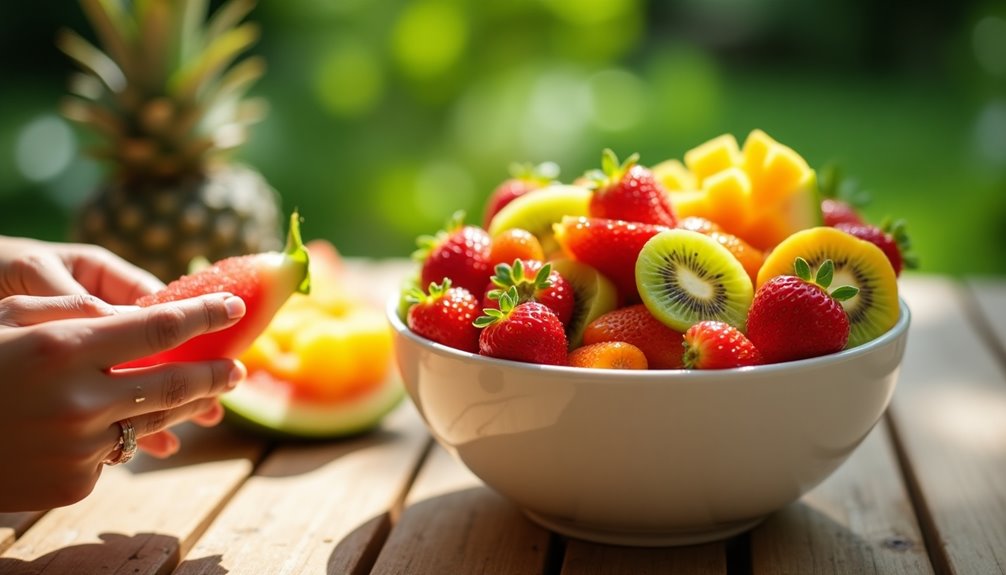
Personal encounters and accounts from those who've embraced the fruitarian diet can offer valuable insights into its advantages and obstacles. Many individuals share triumph tales that showcase significant changes, both physically and emotionally. For example, you might come across someone who encountered a striking transformation in their energy levels, skin clarity, and general mood. These stories often highlight a newfound sense of liveliness that arises from consuming a diet abundant in fruits.
However, it's crucial to acknowledge the challenges that come with this lifestyle. Some individuals report initial struggles, such as yearnings for other food categories or social settings where fruit isn't the primary focus. These challenges can be intimidating, but they also offer opportunities for growth and self-discovery.
As you navigate this journey, you might find it beneficial to seek guidance from those who've trodden this path before you. Many seasoned fruitarians suggest gradually shifting to the diet, allowing your body to adapt. Additionally, utilizing brainwave guidance technology can enhance your mental clarity and emotional balance during this transition.
When you interact with communities or forums, you'll often encounter a supportive network keen to share tips and motivation. They'll remind you to heed your body and adjust your approach as necessary. Ultimately, while success anecdotes offer motivation, it's the collective experiences of overcoming challenges that genuinely nurture a sense of belonging.
Embracing the fruitarian diet can be a distinctive expedition, and hearing from others who've prospered can empower you to commence on your own venture.
Frequently Asked Questions
Can Children Safely Follow a Fruitarian Diet?
When considering if children can safely follow any restrictive diet, it's important to assess their nutritional needs. A diet lacking in essential nutrients might hinder their growth and development. Children require a balanced intake of proteins, fats, vitamins, and minerals to thrive.
If you're thinking about a specific diet for your child, consult a healthcare professional to confirm it meets their health requirements and supports their overall well-being.
How Does a Fruitarian Diet Affect Athletic Performance?
Ever wonder if you could fuel your athletic pursuits with just fruit? While a fruit-centric diet might sound appealing, it can lead to nutrient deficiencies that impact your performance. You might find your energy levels fluctuating, making it harder to maintain endurance and strength.
A balanced approach guarantees you're getting the vitamins and minerals necessary for peak performance, so consider incorporating a variety of foods to support your athletic goals effectively.
Are There Any Cultural or Religious Considerations With Fruitarianism?
When exploring cultural or religious considerations, you'll find that dietary restrictions often stem from deep cultural beliefs and ethical considerations. Different faiths may promote plant-based diets for spiritual reasons, while others might've specific practices around food consumption. Understanding these perspectives can help you connect with others who share similar values, fostering a sense of belonging.
It's crucial to respect these practices and acknowledge their significance in various communities.
What Are the Best Fruits for Smoothies on a Fruitarian Diet?
When it comes to crafting delightful smoothies, embracing fruit variety can elevate your experience.
Consider blending bananas for creaminess, berries for a burst of flavor, and mangoes for tropical sweetness.
These fruits not only contribute to delicious smoothie recipes but also provide essential nutrients.
You'll find that experimenting with different combinations can lead to satisfying results, fostering a sense of belonging to a vibrant community of smoothie enthusiasts.
Enjoy the journey of flavor exploration!
How Do I Manage Cravings for Non-Fruit Foods?
Managing cravings for non-fruit foods can be challenging, but it's all about cravings management. Start by incorporating healthy alternatives like smoothies or fruit salads that satisfy your taste buds.
Practice mindful eating; savor each bite to enhance your experience. Engage in self-care practices such as staying hydrated and finding enjoyable activities that distract you.
Conclusion
To wrap up, although the fruitarian diet can provide some health advantages, it's essential to acknowledge its nutritional challenges. You might notice weight loss and enhanced energy in the beginning, but long-term viability could be a concern because of potential deficiencies. It may be vital to balance your fruit consumption with other food categories to uphold general well-being. Keep in mind, it's advisable to seek advice from a healthcare provider before implementing significant dietary alterations to guarantee your body receives the necessary nutrients.

